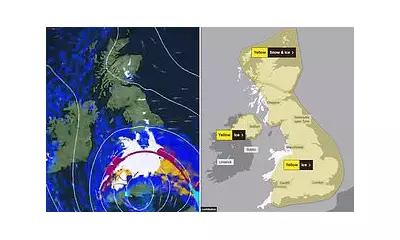
Britons have long contended with a peculiar winter paradox: while the mercury rarely plunges as low as it does in Canada, the cold experienced in the UK often feels far more bitter and penetrating. This sensation, frequently debated on social media where international observers scoff at relatively mild UK temperatures, has a compelling scientific explanation rooted in humidity, urban design, and building standards.
The Science of Damp Cold
In a revealing Instagram video, Ashley Zixuan dissected why London's chill—and by extension, much of the UK's—can feel so harsh. The core of the issue lies in heat conductivity. UK air is typically damp, and when cold temperatures combine with high humidity, it results in high thermal conductivity. This means the water molecules suspended in the air actively pull heat away from your skin much faster than dry air can.
Ashley explained, "This is because of heat conductivity. London's air is damp. Cold and humidity mean high thermal conductivity. This means that water molecules in the air will pull heat away from your skin faster than dry air." In contrast, Canada's extreme cold is usually a 'dry cold', where the lack of moisture means you lose body heat at a slower rate, making sub-zero temperatures feel more manageable than the UK's near-freezing dampness.
The Urban Canyon Effect and Building Woes
The damp air is not the only factor amplifying the UK's winter misery. The very layout of historic British cities, particularly London, creates a phenomenon known as the urban canyon effect.
"London's historic streets create something called the urban canyon effect," Ashley noted. "Wind gets compressed through narrow alleys and moves faster. Faster wind strips heat away from your skin, so you feel colder. Wind also means that clothing is less effective." This accelerated wind chill in confined spaces makes a significant difference in perceived temperature.
Conversely, many Canadian suburbs are designed with wider, more open street layouts, allowing wind to move around buildings rather than being funneled and accelerated through them.
Compounding the problem is the state of UK housing. Ashley pointed out that Canadian buildings generally have superior insulation compared to UK properties. The UK's abundance of old and listed buildings, often fitted with single-glazed windows, allows cold air to seep in continuously. These homes, which also typically lack air conditioning for summer, are poorly equipped to retain heat during the long winter months.
Validation from International Experience
The explanation resonated deeply with viewers who have experienced this climatic quirk firsthand. Many commented that they find the cold in UK cities more unbearable than the deeper freezes experienced on ski holidays in Switzerland or other parts of Europe.
One individual remarked, "I had a girl from Norway say that the UK winter is worse than Norway!" Another added, "Yes! Finally, someone explained it well! In Switzerland, Poland, or Germany, we get lower temperatures, but still can go skiing, do activities... But when I'm in London, it's a different story. It's unbearable because it's a wet cold. It disrespects our jackets and any effort to stay dry and warm."
A third viewer provided a striking comparison, writing, "London feels colder than Moscow. Even though the temperature is higher here, it feels freezing." This collective experience confirms that the UK's unique combination of dampness, wind, and infrastructure creates a winter sensation that is uniquely and notoriously harsh.





